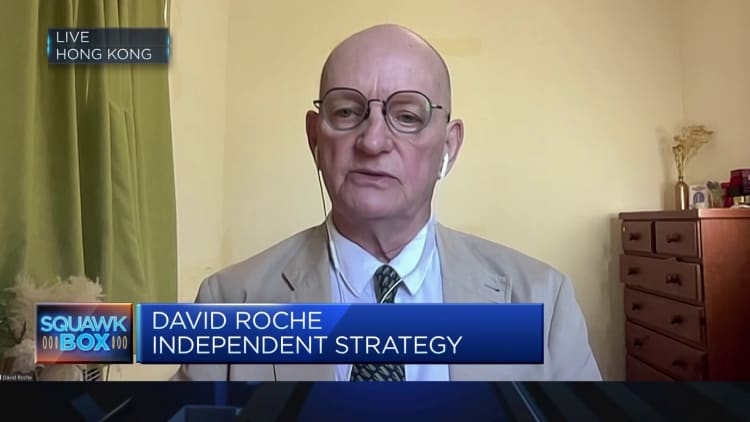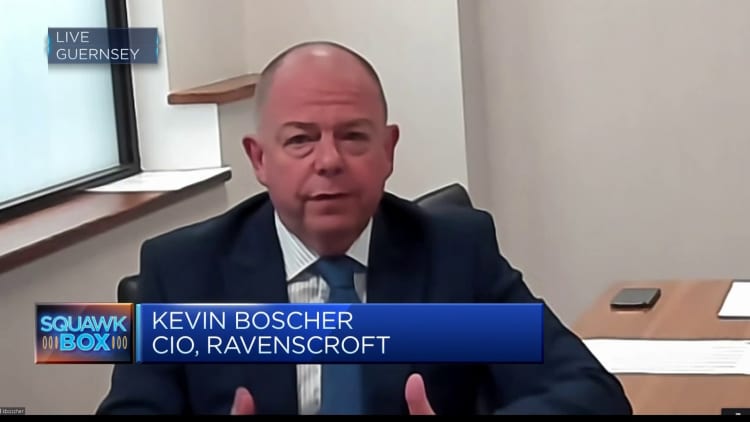Strategist David Roche says we’ll avoid a global recession, central banks will ‘change the goalposts’

A Now Hiring sign is seen inside a WholeFoods store in New York City.
Adam Jeffery | CNBC
The global economy will likely avoid a recession and central banks will need to “change the goalposts” on inflation, according to veteran strategist David Roche.
With high inflation proving sticky across many major economies, central banks have tightened monetary policy aggressively over the past 18 months. Further hikes to interest rates are expected later this year amid tight labor markets and resilient economic activity.
It’s led a growing number of economists to believe that the additional rate rises will tip several major economies into recession, with some even suggesting that a downturn could be necessary to achieve the levels of demand destruction and unemployment that would bring about disinflation.
The market is pricing a further 25 basis point hike from the U.S. Federal Reserve later this month, though a cooler-than-expected June consumer price inflation reading on Wednesday fueled optimism that prices are finally beginning to moderate.
Roche suggested that since figures are beginning to reflect year-on-year comparisons to the sudden spike in prices last spring following Russia’s invasion of Ukraine, the Fed will be hesitant to begin cutting rates back from their current elevated levels until “well into next year.”
“I think a real fear is the fact that they could cut too early and be the culprits of engendering higher inflation for a second time, so I think if anything, they will stay the course,” said Roche, a veteran investor and president of research house Independent Strategy.
“Will that produce deflation, will that produce recession? I actually don’t think so, and the reason for that is that labor markets and disposable income — what people have to spend — are behaving differently this time.”
The year-over-year inflation rate dropped from 4% in May to 3% in June, largely due to falling energy and transportation prices, while core inflation — which excludes volatile food and energy costs — slowed to increase by just 0.2% month-on-month. Annual core CPI remained comparatively high at 4.8%.
Roche, who correctly predicted the development of the Asian crisis in 1997 and the 2008 global financial crisis, noted that the global economy is currently seeing a “gradual reduction” in labor demand and a “gradual reduction in hourly wages,” but not the “catastrophic collapse in employment which would create a recession.”
Unlike the oft-referenced “goldilocks scenario” in which borrowing costs are coming down and growth is accelerating, Roche suggested the global economy is looking at a period of static growth with rates remaining high. He said this raises the question of how to bring inflation back towards the Fed’s 2% target without a “long period of pain.”
“Or do you simply change the goalposts, or change the goalposts without really saying so, which is what I think central banks are going to do?” he added.
No chance of ‘immaculate disinflation’
The dismissal of any possible “goldilocks” scenario for the global economy was echoed earlier this week by JPMorgan Asset Management, though on different grounds.
Stock markets and other risk assets rallied Wednesday on the back of the cooler U.S. CPI print, and have enjoyed a bumper first half of the year despite persistent concerns about central banks having to continue driving down growth in order to rein in inflation.
The S&P 500 is up more than 16% year-to-date, while the tech-heavy Nasdaq 100 has soared by almost 40%. Gains in Europe and Asia have been more modest, with the pan-European Stoxx 600 up more than 8% and the MSCI Asia ex-Japan almost 3% higher.
At a roundtable event on Tuesday, JPMorgan Global Market Strategist Hugh Gimber said current market positioning is built on an economic outlook that is “too good to be true,” with investors less well prepared for the “necessary” slowdown that “central banks are determined to achieve.”

“We are skeptical about this notion that we can see what I’d call immaculate disinflation. We don’t think core inflation gets back to target without a meaningful hit to growth, and therefore we’re uncomfortable with the markets seeing inflation coming down and therefore potentially a recession might be avoided,” Gimber said.
He added that core inflation will not reach tolerable levels for central banks without a weaker period for the global economy.
“Therefore, as a result of the market moves that we’ve seen in the first half of this year, we expect higher volatility ahead,” Gimber said.
“We think that ultimately total returns on a 12-month forward basis across risk assets could be coming under significant pressure, and therefore this is a time for investors to be focused on portfolio resilience.”
